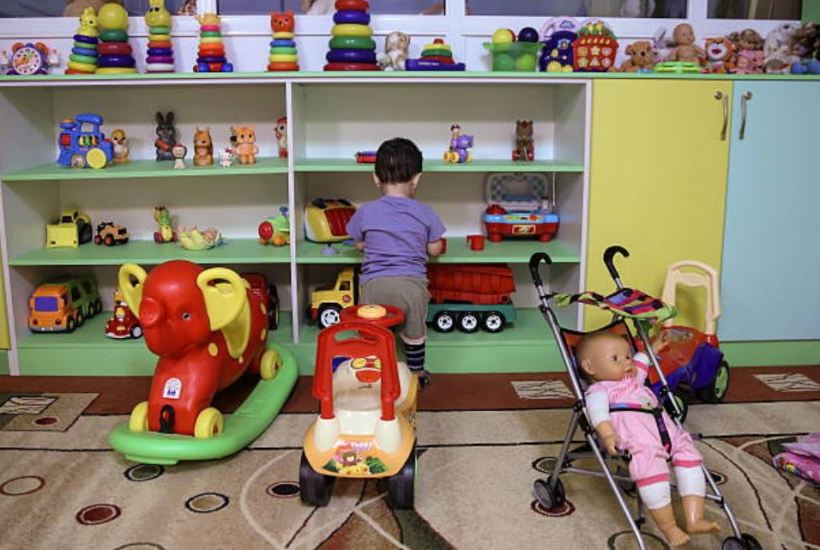In case you didn’t notice, Tuesday was Keep Your Children Home Day – in other words, a nationwide childcare workers’ strike. The campaign represents yet another assault on childcare affordability from the union movement, whose agenda has been driving up prices for years.
‘If you have a child in early learning, please keep them home on 27 March,’ bleated the website of United Voice, the childcare sector union, ‘and register your support to be a part of securing the best outcomes for every child and their educator’.
Unfortunately, for many parents there was no choice, with the union boasting about ‘rolling closures’ at over 300 childcare centres.
Part of the justification for the strike is that current wages no longer reflect ‘the qualifications and skills required to educate our children’ given that ‘the sector has changed [and] everyone must [by law] have qualifications.’
In some ways, the union has a point. Minimum tertiary qualification requirements were slapped on childcare workers in 2012, as part of a broader suite of red tape imposed on the sector by the Gillard Government known as the National Quality Framework.
Naturally, these minimum qualifications have created a substantial barrier to entry for would-be childcare workers. IPA research – to be published in the upcoming edition of the IPA Review – estimates that it can take over 300 hours of work for childcare staff to ‘break even’ on the thousands of dollars needed to get the necessary qualifications.
But unfortunately for the union, this overcredentialisation of the childcare sector is a problem of their own making. United Voice (then known by its former name, the Liquor, Hospitality and Miscellaneous Union) lobbied extensively for the NQF prior to its introduction. In its submission to an inquiry in 2009, the union argued that:
In addition to the mandating of 4 year qualified ECEC [early childhood qualification and care] staff to implement ‘across the long day’ preschool programs, LHMU would argue for an introduction of mandatory minimum qualifications for all staff working in early childhood… We would propose that the entry level qualification be pegged to an AQF Certificate III in Children’s Services.
United Voice argued then (and still does) that such requirements are a vital to ensuring quality in the sector. But like many regulatory solutions in search of a problem, the NQF has created a red tape burden on childcare centres with questionable benefits.
The Australian Childcare Alliance, for example, has claimed that ‘[s]ervices are struggling under the financial costs of the implementation of the NQF, in particular costs related to increases in staffing requirements and increased paperwork’. A subsequent survey by the group’s NSW branch found that around 60 per cent of operators believe that the NQF had a negative impact on the cost of running a childcare centre and increased their time spent on paperwork. Less than 15 per cent reported improvement to educational outcomes.
Unsurprisingly, many childcare centres – particularly smaller ones – have expressed frustration directly. In a submission to a Productivity Commission inquiry into the sector, one operator claimed that:
As soon as government determined that staff should all hold certifications, wages started spiralling. Certification alone does not provide better staff. I have never been asked by a parent, and I am in centres seeing parents every day, about a staff member’s qualifications… You do not need a 4 year university educated teacher to teach early childhood to preschoolers. I know this and so do other operators.
But while the quality gains of the NQF are questionable, the cost impact is clear. The introduction of the package saw prices soar, rising by over 50 per cent to date. These costs have largely been borne by the taxpayer, with federal government spending alone doubling since the NQF’s introduction. Expenditure is projected to swell to over $10 billion within four years, which will make childcare subsidies one of the federal government’s most expensive programmes.
The pay rises demanded by United Voice would add even greater cost pressures to a sector whose costs are already spiralling out of control, thanks to the red tape for which the union lobbied in the first place.
United Voice will continue to caterwaul about ‘better outcomes for every child and their educator’. But all that their agitation has given us thus far is barriers to entry for would-be childcare workers, soaring costs for parents and a debt burden for future taxpayers – many of whom are the childcare-age children of today.
Gideon Rozner is a Research Fellow at the Institute of Public Affairs
Got something to add? Join the discussion and comment below.
Got something to add? Join the discussion and comment below.
Get 10 issues for just $10
Subscribe to The Spectator Australia today for the next 10 magazine issues, plus full online access, for just $10.


























Comments
Don't miss out
Join the conversation with other Spectator Australia readers. Subscribe to leave a comment.
SUBSCRIBEAlready a subscriber? Log in